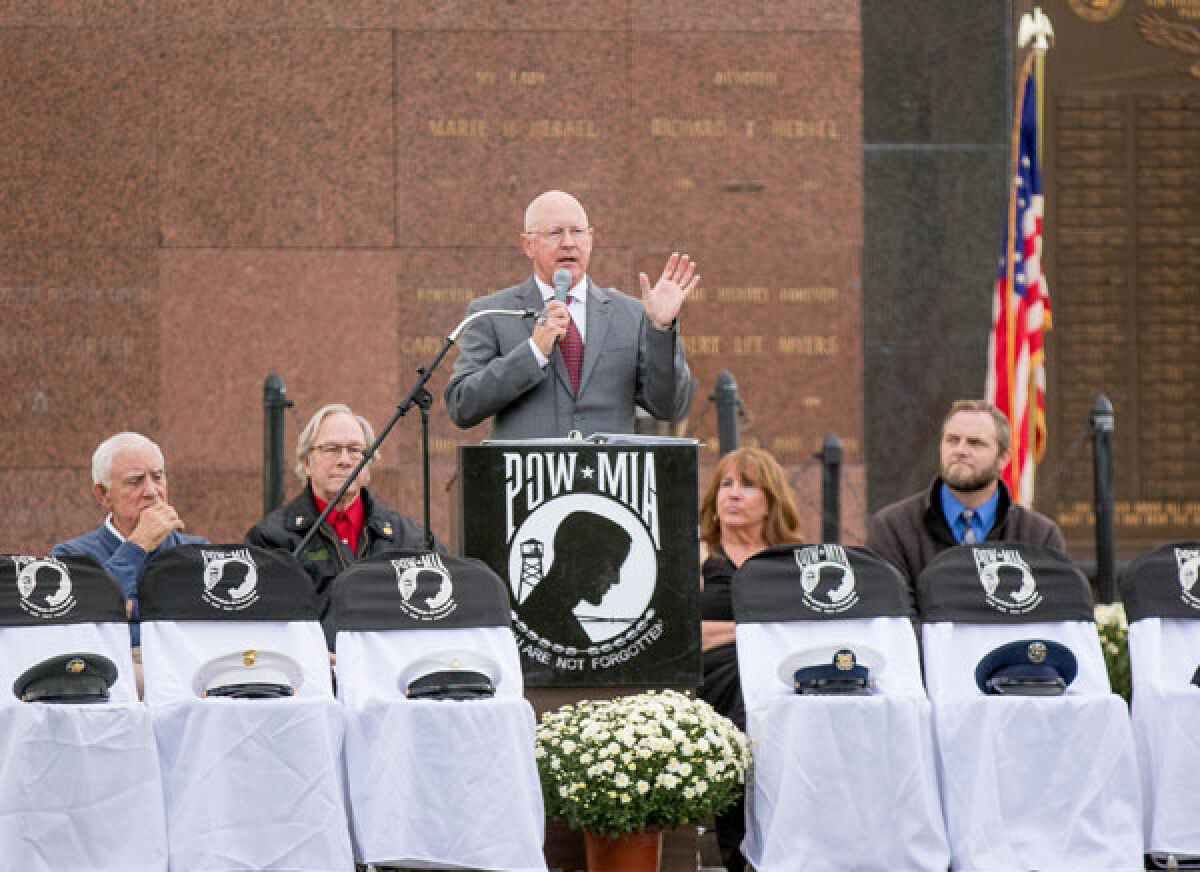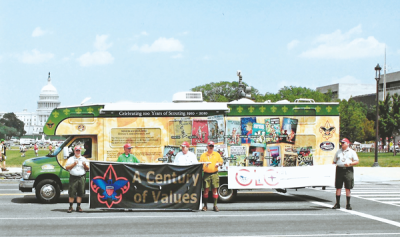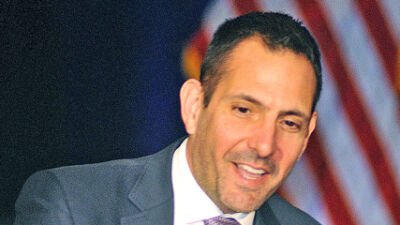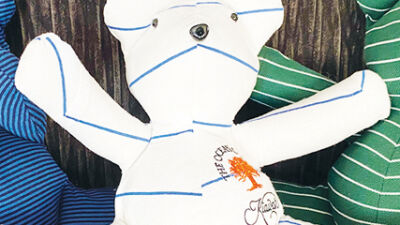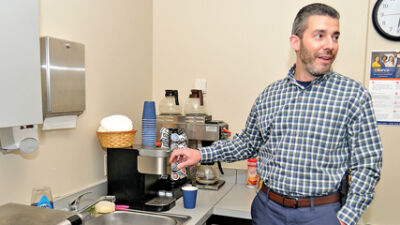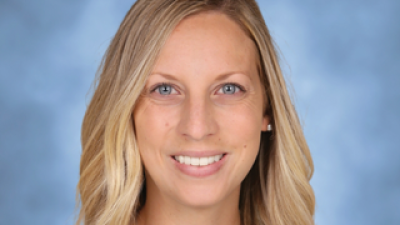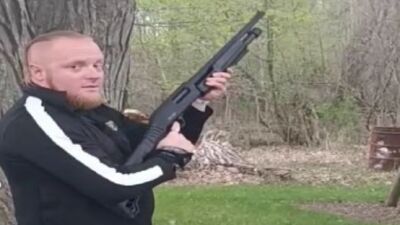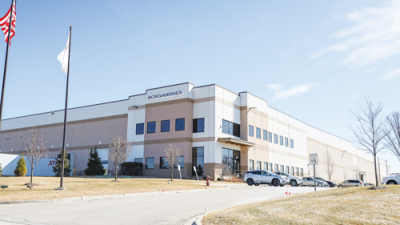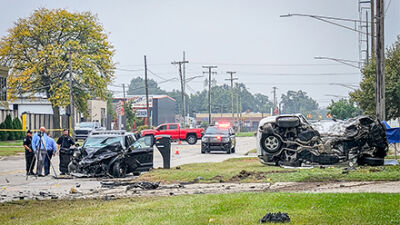NOVI — The 44th annual National POW/MIA Recognition Day was celebrated in Novi Sept. 15 with the 37th annual “Michigan Remembers” ceremony at the prisoner of war and missing in action memorial at Oakland Hills Memorial Gardens, at 12 Mile and Novi roads.
“We gather today to remember the heroism and sacrifices made by tens of thousands of Americans who have endured captivity at enemies’ hands, as well as those whose remains are still unknown,” said Debbie Pineau McClain, the president of the POW Committee of Michigan.
According to McClain, when the POW/MIA memorial was first placed at Oakland Hills in 1987, only seven of the 84 names of Michigan POW/MIAs had return dates, meaning that their bodies had been recovered and given a proper burial and their families had some closure. Today, she said, 36 of the 84 names have “return dates.” This leaves 48 Michigan soldiers whose bodies have never been returned.
“May we, as their loyal countrymen, never abandon their memory or allow their sacrifices to slip from our national consciousness,” McClain said.
Art Massucci, of Royal Oak, spoke of his brother at the ceremony. Capt. Martin Massucci has been missing since October 1965, when the F-4C fighter jet that he was co-piloting was knocked down by enemy fire over Vietnam.
Massucci also spoke of the struggles that his family had after learning that his brother was missing in action. Massucci said his dad worked to find answers and attempted to bring Martin Massucci home until he passed away at 90. Massucci’s mother died just three years after learning of Martin Massucci’s disappearance.
“I’ve always considered her a casualty of the war that the government never counted,” Massucci said.
Although Martin Massucci has been gone for 58 years, he is known to his nieces and nephews and their children through stories told by Art Massucci and his sister. Art Massucci said every day he raises and lowers both the American and the POW/MIA flags, says a prayer, and thinks of his brother and the other soldiers who are still unaccounted for.
“I was raised to find the positive in all situations. For many years that seemed impossible, but as my search for what happened to my brother continued, I have had the opportunity to meet some of the finest Americans alive: the Vietnam vets,” Massucci said.
“Each one I meet, through their love of country and deep concern for my brother, has helped fill a void in my life that was created the day my brother’s plane was shot down,” Massucci said. “So today I say thank you for your service, and also thank you for your love of country. This love has filled a void in my life and has helped me cope with the loss of my brother — my best friend.”
The great-nephew of returned Michigan MIA Merl R. Meadows, Kenneth Thiel, spoke of the power of remembering those who were prisoners of war or missing in action.
“There’s a picture in the archives of my grandfather holding up a 3-year-old me at the wall behind us, pointing to the name of his brother, my great-uncle Merl. It’s a powerful image in the sense that I think it embodies the concept of ‘you are not forgotten.’ Here was a great man showing me the name of another great man who I would never meet, but whose name I would forever know,” said Thiel. “And all of the names on this wall are great men whose names we will forever see and thus never forget.”
Capt. Dennis L. Hopkins gave the keynote address. Hopkins served in the U.S. Navy from 1977 to 2003. Hopkins recalled watching the news during Vietnam and said he would hear the count daily of the number of soldiers killed in action, wounded in action and those missing in action. He said it became ingrained and got to the point where it was understood what happened to those killed and the wounded, but he wanted to know what happened to those missing.
He said he got a bracelet with the name of a soldier missing in action and wore it for many years. He said he only took it off when the Navy told him it was not part of his official uniform and could not be worn. The soldier whose name was on the bracelet eventually was found and repatriated in 2009.
Hopkins said that although he personally doesn’t have family members who were prisoners of war or missing in action, he did know two soldiers who are now POW/MIA. He told of a soldier, Lt. Cmdr. Scott Speicher, who was shot down while he was stationed in Iraq. He spoke of the moment he was told that Speicher had disappeared off the radar Jan. 17, 1991.
“The night of Jan. 17, 1991, was the night that shock and awe hit over Iraq, and I can still see standing in the combat information center of our cruiser looking at the radar plots and all of a sudden the whole radar screen was just a mass of incoming missiles, aircraft, anything with wings on it heading over to Iraq,” Hopkins said. “Scotty was on a combat air patrol, CAP, mission at about 28,000 feet, and all of a sudden he vanished from the screen. One of the air controllers called me over and said … ‘I don’t know what happened. I don’t know what, but he’s gone.’ Couldn’t search for the man when things were happening, and so he was listed as the first casualty of that conflict and the first MIA.”
He said that in the years since, one of Speicher’s wingmen didn’t forget and kept pressing the government, the State Department, and the military until Speicher’s body was discovered and brought home. Speicher was buried in Jacksonville in 2009.
“The whole point of this is that we don’t forget, that we don’t forget either our friends that we knew, a wristband that we used to wear, or our family members, but it is up to us,” said Hopkins. “It’s up to us, because if we don’t, then our children and our grandchildren aren’t going to know, and so we need to be the ones that are going to show them.”
Wreaths were placed at the memorial by several organizations including the POW Committee of Michigan, Veterans of Foreign Wars Post 108 of Waterford, VFW Post 1519 of Northville, Rolling Thunder Michigan Chapter 5 and Oakland Hills Memorial Gardens. The ceremony concluded with the reading of the names of each of the 84 Michigan MIA/POW service members, the playing of taps, and a 21-gun salute. Attendees were invited to pick up a plastic soldier as a reminder to pray for the MIAs and POWs who have yet to come home.
 Publication select ▼
Publication select ▼